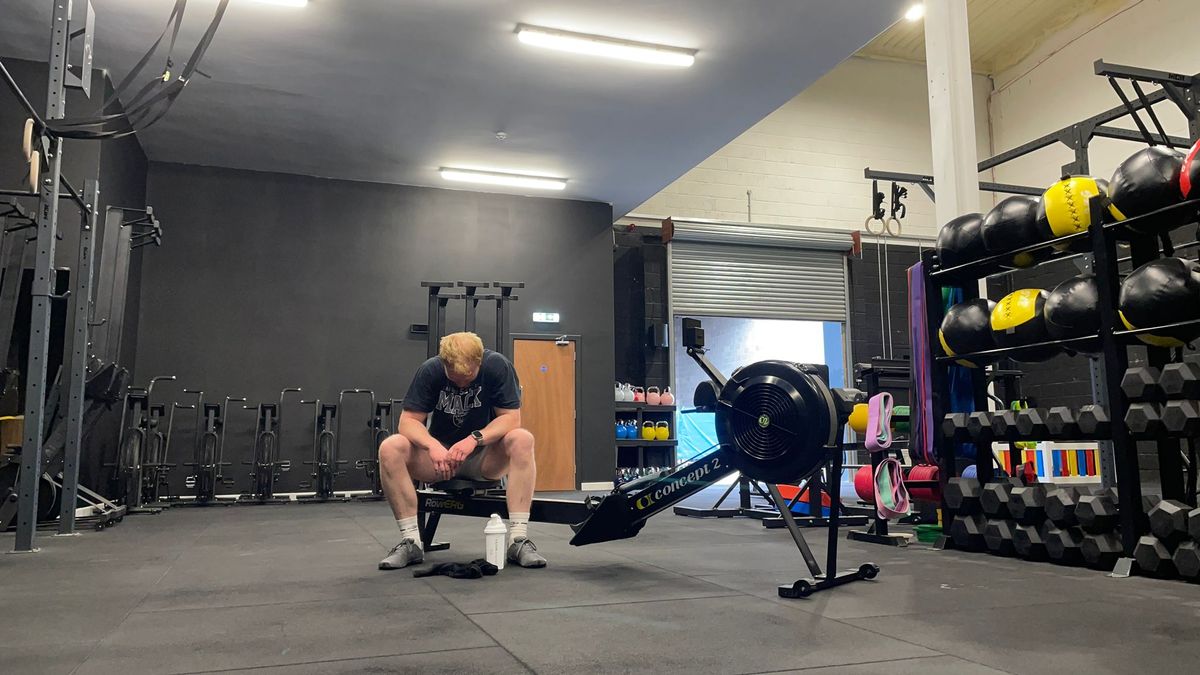Each year, the CrossFit Games subjects athletes to a series of grueling physical tests in a bid to crown the fittest man and woman on earth. Having won five consecutive titles between 2016 and 2020, more than any individual male athlete, Mat Fraser has a strong case for being named the fittest man in history.
Throughout his illustrious career, there was one 20-minute workout which Fraser repeatedly returned to as a fitness yardstick of sorts, and anyone with access to a Concept2 RowErg can give it a try. So that’s exactly what I did.
How to do CrossFit champ Mat Fraser’s go-to workout
The test is simple: row for 1min 40sec, rest for 20 seconds, then repeat this sequence for nine total rounds. Between rounds five and six, you can take a two-minute breather.
The aim is to hold a consistent pace across all rounds, with Fraser’s gold standard reported to be at 1min 40sec/500m, or 500m in each interval. You don’t have to match this to get a great workout, just make sure you pick a target pace that’s challenging for you (a good pace to aim for is one you can hold throughout Hugh Jackman’s favorite 2km row workout).
To try Fraser’s test for yourself, you could mess about with interval timers and custom workout settings on one of the best smartwatches – you’ll need to do this if you’re tackling it on another rower like the Hydrow or Peloton Row. Or, if you have a Concept2 RowErg, you can find the session under the default workouts pre-loaded on its PM5 monitor.
To get there from the home screen, hit “select workout”, “custom list”, “v1:40/:20r…9” then “continue”. This will take you to a screen with the time remaining of the interval at the top and the number of the interval you’re on near the bottom, along with other customizable metrics like your current and average pace per 500m. The timer will start counting down automatically on your first stroke, so there’s no need to worry about false starts.
My experience of Mat Fraser’s go-to rowing machine workout
That five-time fittest man on earth Mat Fraser describes this workout as “intimidating” told me all I needed to know going in, so I settled into the seat of my rowing machine with a good deal of trepidation.
Fraser also says this test is “as hard as you want it to be”. I knew his 1min 40sec/500m standard was beyond my capabilities, so I instead identified 1min 50sec/500m as an aggressive pace to try and hold.
The first round went disarmingly well, and I finished with a pace of 1min 50sec/500m on the dot. My breathing was regular and under control, while my fresh legs generated plenty of power with each stroke.
From experience, the Concept2 RowErg rewards slower, purposeful, and powerful pulls as much as it does short, quickfire ones. I find the former is far less likely to send my heart rate rocketing irretrievably skywards, so I aimed to maintain 24 strong strokes per minute and hold off fatigue for as long as possible.
But the best-laid plans often go awry, and despite my tactics, the second interval felt significantly harder than the first.
My pace gradually slowed, and by round five I’d fallen well off the pace at 1min 53.6sec/500m. Worse, I was struggling to catch my breath, sweat was now pouring from my brow, and the muscles in my thighs, back, and biceps were on fire – my early composure had clearly abandoned me.
You’d think the 20-second breathers were a brief but welcome relief from this discomfort, but I found them more of a hindrance than a help. By the time my body registered I’d ground to a halt, it was time to start rowing again, only now I had to throw extra effort into getting the machine back up to speed.
After round five, I took to my two-minute break with the enthusiasm of a desert explorer stumbling across an oasis. The interlude allowed my body to recuperate just enough to attack the sixth interval with renewed vigor, and this wound up being my best of the test at 1min 48.7sec/500m.
But, as before, every interval felt harder than the last. I was able to hold roughly 1min 51sec for the remaining rounds, but my grimace chipped deeper into my cheeks with every passing minute.
After my final stroke, I crawled onto the floor for a well-earned lie-down, and thanked past me for his foresight – I’d planned it so this workout was my final commitment in the gym that day, which was a blessing given how spent I felt now.
What are the benefits of Mat Fraser’s go-to rowing machine workout
This workout is going to put your heart and lungs to the test. Keep returning to it, attempting to progress your pace over time, and you’ll likely see significant improvements to your cardiorespiratory fitness.
Rowing also recruits every major muscle group in your body over the course of each stroke, demanding plenty of energy, elevating calorie burn, and boosting your metabolism.
It won’t provide the resistance most people need to build strength and muscle (strength training should be your first port of call for these goals) but it will test your muscular endurance – the ability of your muscles to consistently and repeatedly produce force over time. If you want proof of this, just see how your glutes feel after Fraser’s test.








:max_bytes(150000):strip_icc()/roundup-writereditor-loved-deals-tout-f5de51f85de145b2b1eb99cdb7b6cb84.jpg)


